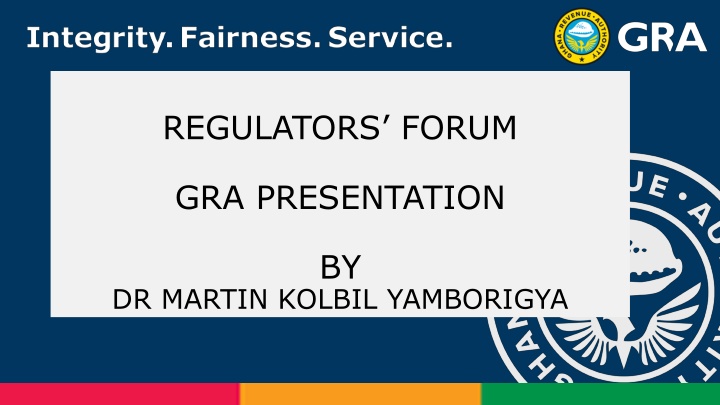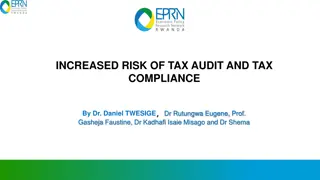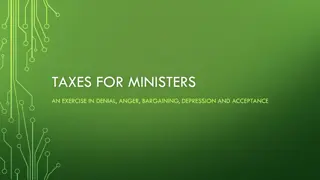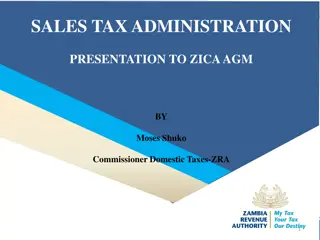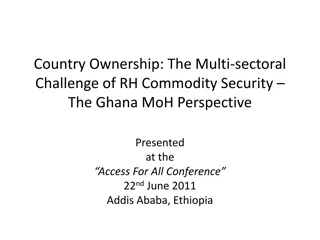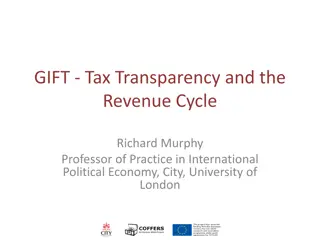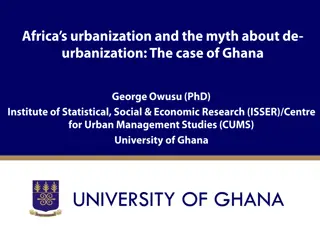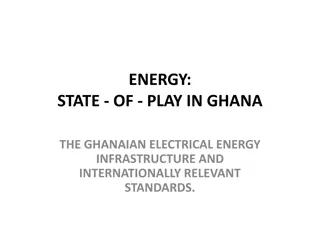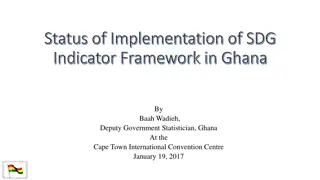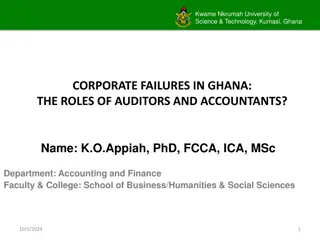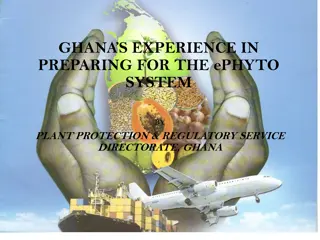Tax Administration and Compliance in Ghana: A Presentation by Dr. Martin Kolbil Yamborigya
Presentation by Dr. Martin Kolbil Yamborigya on the Ghana Revenue Authority (GRA) focusing on its mandate, support from other regulators, measures to enhance compliance, and conclusion. Discusses the functions of GRA, its establishment, divisions, and responsibilities in tax collection, compliance, education, and fraud prevention. Emphasizes the importance of taxpayer compliance with tax laws and regulations in Ghana.
Download Presentation

Please find below an Image/Link to download the presentation.
The content on the website is provided AS IS for your information and personal use only. It may not be sold, licensed, or shared on other websites without obtaining consent from the author.If you encounter any issues during the download, it is possible that the publisher has removed the file from their server.
You are allowed to download the files provided on this website for personal or commercial use, subject to the condition that they are used lawfully. All files are the property of their respective owners.
The content on the website is provided AS IS for your information and personal use only. It may not be sold, licensed, or shared on other websites without obtaining consent from the author.
E N D
Presentation Transcript
REGULATORS FORUM GRA PRESENTATION BY DR MARTIN KOLBIL YAMBORIGYA
Outline of Presentation Mandate of the GRA Support from other Regulators Measures to Enhance Compliance Conclusion
The Ghana Revenue Authority The Ghana Revenue Authority was established by the Ghana Revenue Authority Act, 2009 (Act 791) to integrate the erst while revenue institutions IRS, CEPS and VAT Service into a single autonomous tax administration institution. The Ghana Revenue Authority has three Divisions: Domestic Tax Revenue Division (DTRD) Custom Division (CD) Support Service Division (SSD)
The Function of Ghana Revenue Authority The mandate of the GRA is to collect all tax revenues due in a fair and efficient way with limited costs for taxpayers. The main functions are: (a) Assess and collect taxes, interest and penalties on taxes due to the Republic with optimum efficiency; (b) Pay the amounts collected into the Consolidated Fund unless otherwise provided by this Act and other Acts; (c) Promote tax compliance and tax education; (d) Combat tax fraud and evasion and co-operate to that effect with other competent law enforcement agencies and revenue agencies in other countries;
The Mandate of Ghana Revenue Authority (e) Advise District Assemblies on the assessment and collection of their revenue; (f) Prepare and publish reports and statistics related to its revenue collection; (g) Make recommendations to the Minister on revenue collection policy; and (h) Perform any other function in relation to revenue as directed by the Minister or assigned to it under any other enactment
SUPPORT FROM OTHER REGULATORS Though the GRA has the sole responsibility for tax administration in Ghana, it cannot do that solely by itself Taxpayers needs to comply with the tax laws which include: Registering with GRA and the various tax types Keeping and maintaining proper records of your business Filing your returns on due dates
SUPPORT FROM OTHER REGULATORS Paying your tax on due dates Making business records available for examination and auditing Informing GRA of any changes in your business
SUPPORT FROM OTHER REGULATORS The GRA therefore relies much on the work of other Regulators in carrying out it mandate. 1. Ensuring persons are registered with the GRA before transacting business with them 2. Demanding for a tax clearance certificate to ensure the person is in good standing 3. Auditors are to ensure that taxpayers are maintaining proper records for the purpose of taxes 4. Withholding tax from payment where it is required
SUPPORT FROM OTHER REGULATORS 5. Paying taxes deducted to the GRA 6. Insisting on VAT Invoices for all business transactions where required 7. Reporting person engaged in suspected tax evasion or avoidance to the Ghana Revenue Authority.
Measures put in place by GRA to ensure compliance Deployment of GRA Taxpayers Portal Online filing and payment of taxes through GITMIS Can file and pay taxes at the comfort of your home in about 23 banks across the nation Can pay tax using MOMO (*222*Invoice_Number#) View balances on their Ledger (tax position at any time) Know due dates for payments of tax liabilities Verify the income tax paid by employer on behalf, among others
Measures put in place by GRA to ensure compliance Objections to tax decision Tax relief application Refunds Request for amendments of records ICUMS to facilitate clearing of goods at the port Restructuring of DTRD- Bringing the tax office closer to you Introduction of E-Invoicing Introduction of E-TCC
Conclusion It is the hope the GRA that going forward you will all continue to support us in our effort to mobilise the needed revenue for national development
